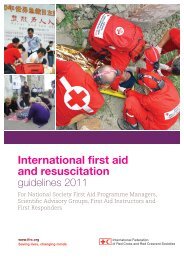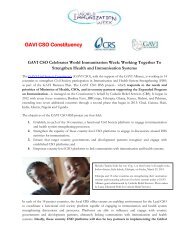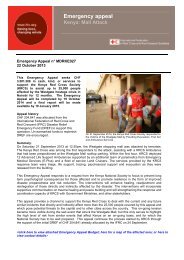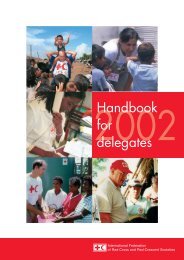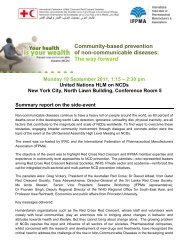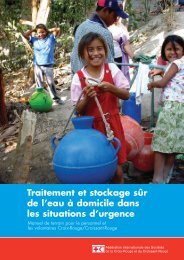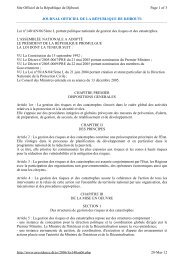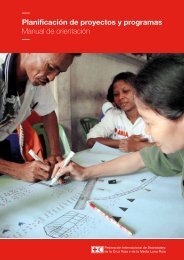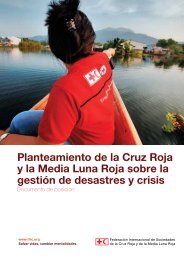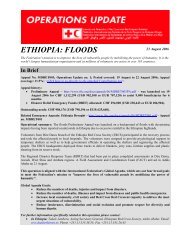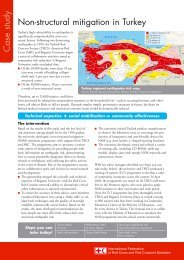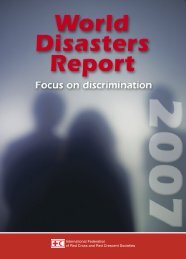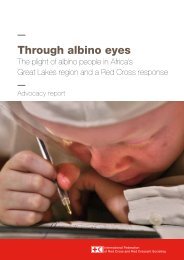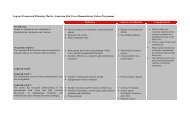World Disasters Report 2010 - International Federation of Red Cross ...
World Disasters Report 2010 - International Federation of Red Cross ...
World Disasters Report 2010 - International Federation of Red Cross ...
Create successful ePaper yourself
Turn your PDF publications into a flip-book with our unique Google optimized e-Paper software.
CHAPTER 7<br />
152<br />
much they contribute to reducing everyday risks and to their understanding <strong>of</strong> how<br />
vulnerability factors are embedded in the local development process.<br />
In Latin America, over the last 20 years, a network <strong>of</strong> academics and practitioners<br />
from different countries and institutions has promoted new approaches to disaster risk<br />
management which stressed disaster risk reduction, local action and local government<br />
responsibility, and worked with vulnerable groups to understand and address disaster<br />
risk. Much <strong>of</strong> this work has been promoted directly or indirectly by La <strong>Red</strong> de Estudios<br />
Sociales en Prevención de Desastres en America Latina (Network <strong>of</strong> social studies in disaster<br />
prevention in Latin America).<br />
Many nations in Latin America now have well-established institutional structures<br />
to support disaster risk reduction. In addition to the Colombian and Nicaraguan<br />
systems mentioned above, other nations have focused on broadening national emergency<br />
systems. For example, Peru’s national system and its civil protection committee,<br />
both <strong>of</strong> which are emergency response structures, focus on capacity building,<br />
training and awareness-raising. In El Salvador, many associations <strong>of</strong> municipalities or<br />
micro-regions exist, for example, the association for land-use planning in the Jiboa<br />
Valley.<br />
Associations and networks <strong>of</strong> local governments have also been created to unite efforts<br />
in addressing risk reduction. After Hurricane Mitch in Honduras, the municipalities<br />
<strong>of</strong> La Masica, Arizona, Esparta, San Francisco and El Porvenir established an association,<br />
MAMUCA (Community <strong>of</strong> central Atlántida municipalities), to unite efforts<br />
and create a platform for dialogue and cooperation in preparing for extreme events and<br />
coordinating local response. This helped shift national disaster management systems to<br />
community level. It involved participatory diagnosis and planning, awareness- raising,<br />
prioritizing strategic reconstruction activities and participating in local decision-<br />
making through public meetings. MAMUCA also became involved in the national<br />
and regional disaster risk management systems, which helped improve evacuations<br />
during storms, through community-based disaster reduction practices, and encouraged<br />
the formation <strong>of</strong> local emergency committees integrated with municipal, regional and<br />
national emergency committees. The municipal emergency committees are chaired by<br />
the mayors and include representatives <strong>of</strong> the local council and local institutions, such<br />
as the police, the fire department and the <strong>Red</strong> <strong>Cross</strong>.<br />
It is still difficult to get national programmes and networks to support local action<br />
and encourage coordination between local governments. Risk reduction needs to be<br />
promoted and supported in most sectors <strong>of</strong> local government and coordinated between<br />
them – no easy task institutionally. Reviews on the actions, programmes and structures<br />
set up after Hurricane Mitch show mixed results in terms <strong>of</strong> how they managed to<br />
embed disaster risk within local development and thus address the structural causes <strong>of</strong><br />
vulnerability.



